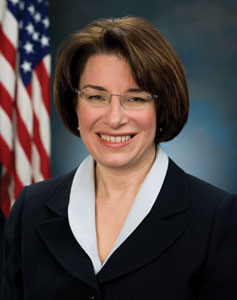By U.S. Senator Amy Klobuchar
As 2020 draws to a close, there are many reasons to be hopeful that next year will be less challenging than this one. Studies have shown that two upcoming coronavirus vaccines are over 90% effective, meaning there is light at the end of the tunnel.
And as we look ahead, we must ensure that states have the resources they need to transport, store, and distribute these vaccines effectively—including in our rural communities.
A coronavirus vaccine is critical to protecting public health and getting our country back up and running. Currently, there are multiple types of vaccines under development, in addition to the Pfizer and Moderna vaccines that are first out of the gate.
As communities across the country await the first doses, a Center for Disease Control (CDC) advisory committee has recommended that priority be given to frontline health care workers, who have been true heroes in the face of this devastating crisis that has upended the lives of millions of Americans — including their own.
The committee has also recommended that the initial doses go to residents and workers in assisted living facilities, where the spread of this virus has had a devastating impact on some of our most vulnerable citizens. But ultimately health experts and officials in Minnesota have the discretion to decide how to distribute these vaccines in our state, as well as future vaccines that may come on to the market.
And they cannot do it alone. Storing, transporting, and distributing these vaccines is not a simple task and requires a great deal of coordination. After all, these vaccines won’t just parachute into Thief River Falls, Luverne, or Grand Marais. Getting them to our residents will require fully functioning airports to receive them, trucks for transporting them around the state, pharmacies and community centers to help with distribution, and other important supplies.
One of the vaccines, for example, requires storage in a freezer of minus 103 degrees Fahrenheit. And while we have no shortage of snow and ice in Minnesota, that kind of cold storage means special facilities in locations around our state. Unfortunately, ultra-cold freezers like this can cost around $10,000 — well out of reach for most of our rural health care providers. And it is critical that communities all over our state — not just in the Twin Cities — can access them.
That’s why I’m working to get the federal resources that states need to execute their plans to store, distribute, and administer the vaccines. This is a critical moment and Congress needs to act immediately to pass a coronavirus relief package that includes funding for vaccine distribution and helps our country get through the difficult months ahead.
There is an initial bipartisan proposal that would do exactly that — including delivering major funding for vaccine distribution and for continued testing, which is critical to get ahead of this virus. The proposal also includes additional funding for the Paycheck Protection Program and help for those who are out of work. Because ultimately, providing relief for our workers, schools, small businesses, restaurants, and small entertainment venues is the best way to help our economy get back on track while the vaccine is being widely distributed.
I have also called on the federal government to work with state and local officials immediately on the logistics for vaccine distribution. Minnesota has been a leader in this, and has already worked with the CDC and the Department of Defense to develop model approaches and best practices for other states to follow when a vaccine becomes available. And our own health systems — including the Mayo Clinic, Allina Health, and HealthPartners — have been hard at work studying the safety and effectiveness of coronavirus vaccines through trials and research.
There are many reasons to be optimistic as we look ahead to next year. And with the stakes this high, it is crucial that our country have both a plan and the necessary funding to get these vaccines out safely and efficiently. I am working in Washington to make sure these things happen and won’t go home for the holidays until it gets done.
In the meantime, we must stay vigilant and continue practicing good public health and safety measures, like wearing masks and abiding by local public health guidelines. We will get through this, but it will require all of us working together, especially during the holidays.


Phoebe Nelson says
What is wrong with your organization? Park Nicolet. People have had one shot at Methodist with no problems. Many not my age and I still cannot get it and I am 81!!